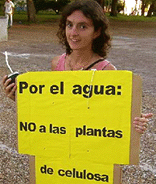
Cellulose and Forestation: Two Sides of a Predatory Model
The construction of two huge cellulose factories on the Uruguay River that threaten to pollute the binational stream illustrates how a model of forestry imposed by neoliberalism in the 1990s is gaining ground in the Southern Cone. Standing on a makeshift stage in the center of Montevideo, writer Eduardo Galeano addressed the crowd in a calm tone: "There are decisions that are made in 15 minutes but have consequences for centuries." It was May 27, 2005 during a demonstration against the construction of two huge cellulose factories on the shores of the Uruguay River. It was not the first time that environmental and social organizations had taken to the streets to protest the two megaprojects, which threaten to pollute the country's main river, shared with Argentina. But it was the first time that it was done under a progressive or leftist government.


